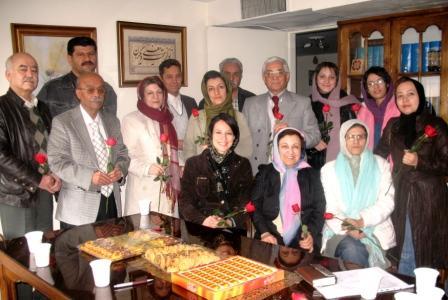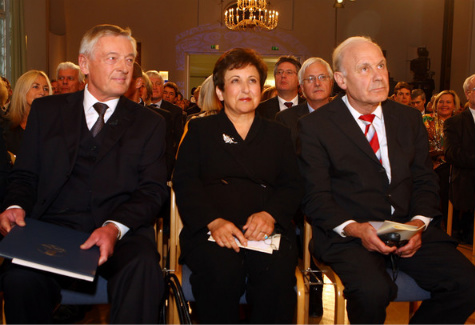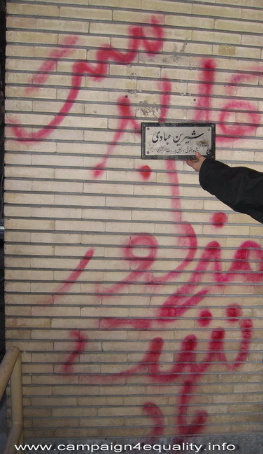ARTISTS: On the dynamic of inspiration - COMMITTING to one's vocation.
Larry Staudt – Principally Blown by the Wind

- With the Dundalk Windmill in the background (New York Times photo)
Larry Staudt has been involved with renewable energy since 1978. He was engineering manager of Enertech Corporation in the USA in the early 1980s, during which time Enertech designed and installed close to 2000 wind turbines, both large and small, and fifty solar hot water heating systems.
He designed and constructed two solar homes. He was a founder member and chief executive of the Irish Wind Energy Association, and a vice president of the European Wind Energy Association. He is lecturer at Dundalk Institute of Technology, teaching and supervising theses in their MSc in Renewable Energy Systems.
He currently lives in breezy Dundalk, Ireland, with his wife Dawn. Their four children, aged 22 to 29, live in various parts of Ireland and Scotland.
***
EBBF: Tell a little how you got into renewable energy.
Larry: Right now it’s such a sexy thing, everyone’s into this. And it’s good to remember that Shoghi Effendi talks about this in one of his letters in which he talks about aspects of the world order we are building. One of the features he mentions is that we will exploit “all the available sources of energy on the surface of the planet”. I was in renewable energy before I found that, but I was really excited when I did, as it provided a real focus for my work
When I left college, I had a conventional career focus, and my first jobs were with control systems for large industrial processes in oil refineries and paper plants. Although I wasn’t a Bahá’í, there was something in me that was dissatisfied with work which I thought was not of real benefit to the human race. Don’t get me wrong; it was great work, very interesting. But I saw no future in this: in 100 years nobody would be working with fossil fuels. It just wasn’t sustainable.

- Installing wind monitoring equipment on campus
EBBF: How did you know about this?
Larry: Well, I recognized that the planet was going down a path that was ultimately unhealthy. I had read “Small is Beautiful”, and was really excited by its ideas [on sustainability]. In fact, I bought 12 copies and sent them to my friends from college. Only one responded to the gift of the book and the suggestion that all was not rosy. And he was a Bahá´í.
I felt I had to be true to my wakening ecological principles, so I left my work to become “part of the solution” as I then saw it. I found a job in Vermont working with solar and wind energy. It was a rudimentary outfit: We were eight people living on principles, with sandals and long hair, no money, but it didn’t matter: we were doing something we believed in. I had an organic garden, built two solar homes—“The world’s going down the tube, so I’m gonna’ grow my organic vegetables…” This is also when I became a Bahá´í.
Well, the company grew from nothing to a 10 million dollar turnover in a matter of years. We started designing and manufacturing wind turbines, some of which are still working in California wind farms. But this was all about principles; I was doing it to help the planet. It certainly wasn’t to make money—I was making much less money than where I was before.
EBBF: This all took place in the northeast US. You were a partner in a budding renewable energy company, and you left it all. How did you end up in Ireland?
Larry: Again, it had to do with my beliefs. At this moment, my wife and I decided we wanted to pioneer [Bahá’i term referring to moving to another area in order to establish and support its community activities]. We had decided that the best time to do it was when the kids were young (we had three then, and four now, 29, 27, 25, 22), before they’d complain about it. So I approached the manager in 1985, and said, ‘Europe is the next big market for wind energy, wouldn’t it be a good to have a representative there?’ The next day he said yes. So off we went to Ireland.
Shortly after arriving in Ireland, we had the typical pioneer experience: tests, which teach you to rely on God. Our company went bankrupt. We had arrived in July, and in December I received a letter from the manager, “Dear Larry, your next paycheck is problematic”. That letter was the severance package, and there I was, an alien in a country with 20% unemployment. Frankly, with three children, at that point I was less worried about my career, than with keeping the family afloat. For three years I managed to make ends meet with a wind consulting business I started with a friend. Then against all odds I ended up getting hired by the Irish Electricity Supply Board (ESB) working on conventional power station projects in Ireland and abroad. The best part about it was that one day a week I was allowed to indulge my passion in renewable energy as ESB’s renewable energy “expert”.
After nine years, the ESB offered a severance package in order to reduce employees in preparation for competition in an open market for electricity. I took advantage of this and joined Airtricity, an Irish renewable electricity company. This company had a chief executive who was a friend and excellent entrepreneur. Airtricity recently sold for 2 billion euros!

- Dundalk College Campus
EBBF: And you’re currently working at a university, no?
Larry: Yes, after working for Airtricity for two years, the opportunity to teach came up, and I started teaching at a technical college in Dundalk, a town halfway between Dublin and Belfast. The director of the college, who is a very forward thinking chap, said, ‘Renewable energy is an important aspect that can be a part of our university’. He encouraged me to develop a research center, where we currently have four people, but I think we’ll grow to nine by early next year. We work with three things: wind energy, bioenergy, and electricity storage. Part of our expertise is in biofuels, and we’re the only Irish facility that can test to European standards, and we do some research into bioenergy from the sea (e.g. oil rich algae that can be farmed).
In 2005 we installed the first large commercial wind turbine on a college campus in the world. When you approach our campus you know we do renewable energy when you see a 60 meter tall turbine. It provides half of the college’s electricity. Our director really supported the process, convincing our board of directors that we should dedicate some of the college’s budget to the project. Enrollments are higher, possibly in part due to the notoriety we have received from the wind turbine, such as an article in last April’s New York Times. Our new town logo has a wind turbine on it!
We are also about to install a very large battery near our wind turbine, to help prove our theoretical work in this area. Electricity storage will play a big role in a renewable energy future.
Dundalk Institute of Technology has three academic programs in renewable energy: an MSc in renewable energy systems (guys from our research center teach the wind and bio energy side of that), programs for the general public, and programs for training and certifying installers of renewable energy equipment. For a research center, we are close to commercial side of things. We know something about the renewable energy business, and so we develop things that will be useful sooner rather than later. Our goal is to license technology we have developed to entrepreneurs, and we have a number of ideas under development. Our interest is to get this stuff out there.
One thing that’s nice about the university job is that we try to keep fresh the reason we are engaged in this work. Every new employee gets the talk: We are here to serve humanity, and our success will depend on how true we are to that.
EBBF: How have the employees responded?
Larry: Fantastically! We are always consulting to come up with new ideas. None of us is focused on money, but even this just comes naturally. We are all convinced that job satisfaction depends on this idea of service. You know, it’s nice when you are the boss, you get to set the tone. And so far it’s working.

- At his office
EBBF: Wind energy, and renewable energy in general, is green and wonderful, but EBBF is, after all, a business forum. Is it actually economically feasible for renewables to produce the amount necessary to power our growing economies?
Larry: You know, there are big business opportunities in renewable energy. The world energy industry is massive. Oil energy is just part of the global business, and it is transforming. Getting from A (conventional energy) to B (renewable energy) could be a traumatic or a planned transition. However, from a business point of view there is no doubt that this is going to happen. I don’t believe there is any other technology out there that will bring us to energy sustainability. Nuclear? The practical point of view is that nuclear fission is the only viable nuclear energy out there, and this itself depends on limited supply of uranium.
Remember, we’re going to ‘exploit all the available sources of energy’, so it is clear there will not be a single energy panacea (e.g. cold fusion) providing all our energy needs. We have to develop all sources ‘on the surface of planet’, and to me this means the various forms of renewable energy.
Let’s look at an example. We have a wind turbine that feeds the campus of Dundalk Institute of Technology. It is rated at 850 Kilowatts, with an average output of 150-200kW. Dundalk is not a very windy spot for Ireland, but it is windy compared to most of the world. It cost us 1.1 million euros, including VAT, and it saves us about 150,000 euros a year on our electricity bill (this doesn’t include carbon savings, etc.). And the price of electricity is rising. Also, since we received a grant that paid almost 40 percent of its cost, the payback is more like 4 years!
EBBF: Now that’s a project that makes economic sense.
Larry: In Ireland it works because the winds are so good. A government program has up to now bought wind generated electricity for 5.7 cents kWh. Eight percent of Ireland’s electricity comes from the wind, so entrepreneurs have built wind farms on the basis of this low price, with no other incentives. In 2007 the price for fossil fuel electricity was 8.64 cents kWh. Just an illustration to show that wind energy is economic in Ireland—and that’s without including carbon credits. Our national goal is 40% renewable electricity by 2020. People are excited about it. It’s amazing that even two years ago people would have scoffed at this high of a goal. In Ireland there is good wind, so it’s a harbinger of good things to come in other countries. It’s a sellers’ market; big wind turbine suppliers look to sell at least 10 turbines at a time – it is difficult to purchase a single large wind turbine!
A coming opportunity is in the small and medium wind business. The economics haven’t been there so far. Bigger turbines are more effective than smaller ones, since they’re higher up and get more wind. But as the price of electricity rises and as smaller wind turbines become mass produced, there will be a big opportunity in the small and medium size wind turbine business (as well as in other areas of renewable energy).
For me, the area of sustainable energy seems like such an obvious arena in which to serve humanity. To be significant in the NOW. To be of real service to humanity by being a pioneer in this area. It’s like what Bahá’u’lláh told us: “Be anxiously concerned with the needs of the age ye live in, and center your deliberations on its exigencies and requirements.”

- With the whole family
EBBF: This is mostly about large-scale energy projects, which are economically out of the reach of individuals. So is there a role for individual action right now in promoting renewable energy?
Larry: Small-scale renewable energy is important. And not just from a wishful thinking point of view. While on the one hand, if you look at the West’s energy demand, most of it is not for household consumption—so you do need to have wind farms to power paper mills. Industrial scale energy consumption requires industrial scale energy production. But on the other, it makes sense to get individuals using renewable energy. For one, when install renewable energy systems locally, then you are much more aware of it, and you consume less energy. You try to match your consumption with your own production (e.g. doing your laundry when the wind is blowing or when you have plenty of hot water from your solar water heating system. This reduces the need for energy from elsewhere. Secondly, having a small-scale renewable energy device has a symbolic value, reminding us of our need to make a personal contribution to living in a sustainable way. They are symbols of social responsibility. I’m trying to convince folks Irish in government that this is true, and to get them to support local generation, but there isn’t much support yet.
EBBF: So that’s another intersection between values and renewable energy—the values of government officials.
Larry: All we can do is make our case. Some years ago we made a computer model of the Irish economy whose function was to show how the economy could cope with the capital investment required for a transition to sustainable energy. (We only have to do the transition once: then energy prices will be stable, and we won’t be dependent on foreign oil.) One scenario showed the government immediately implementing proactive policies coupled with fossil fuel prices not rising too rapidly in the future. A significant part of the energy from fossil fuels would be invested into making renewable energy equipment, since you require certain energy to make wind turbines, the steel, fiberglass, etc. As the cost of energy rises, so does the equipment price. This scenario was successful, but only if we start right now, and not wait until renewable energy is price-competitive with fossil fuels. Then it is too late, since a) massive capital projects require a long time to implement and b) the capital investment required will be too great for the economy to bear.
In all the other modeled scenarios (e.g. if fossil fuel prices rise rapidly, or if there is no pro-active government action), the economy goes into recession. We presented the model, and nobody took it up.
EBBF: Why not?
Larry: My take is that we were engineers telling the economists what to do. So we were guilty of the crime of practicing economics without a license. The proposal currently is gathering dust in the Department of the Environment. I think people just didn’t want to think about it. It seems that present day economics and present day politics are by their nature short-sighted. Making the transition to a sustainable society requires long-term thinking. It is socially prudent to assume the worst case in terms of oil price projections, and plan accordingly. However, economists look at previous price trends and feel they are being conservative by projecting “moderate” price increases, not “radical” price increases. Even if our model is wrong and the peak in world oil production occurs in 20 years instead of two, we will at least be prepared. This is socially prudent and conservative. There is no reason not to act right now, putting into place substantial sustainable energy policies, if you are concerned about the good of humanity.
EBBF: Final question. What do you see as the main shift in values that has to take place in order for people, business, and governments to take up the renewable energy challenge, and the broader challenge of building a more sustainable future?
Larry: So many of our social challenges have a single question at their core: what is the purpose of the human race on this planet? You and I cannot organize any activity without at least some knowledge its purpose. In the Baha’i view, our lives should be spent a) improving our characters so as to be better prepared when we pass on to the next life and b) helping to carry forward an ever-advancing civilization so that future generations can better develop spiritually.
Of course we need material well-being as well, and there is a balance to be found. At the present moment we seem to be exclusively pursuing material well-being, and it’s not working. My career and those of many others show that being service-minded (i.e. trying to behave in a spiritual way) brings material benefits as well. I believe that as people begin to understand their role as servants to society, then we will be happy to make the necessary sacrifices to bring about a sustainable planetary civilization.















